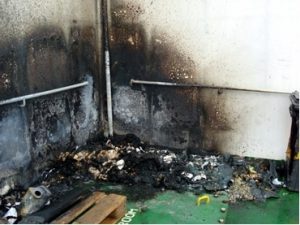The Charity
Aviation
Maritime
Small Fire, High Potential

Initial Report
Report Text:
In the early hours of the morning, a fire broke out on the open poop deck of a merchant ship.
Seven of the vessel’s eight garbage bins stored on the starboard side of the poop deck caught fire causing complete destruction of the seven bins and damage to both sides of the two adjacent bulkheads of the adjoining spaces (the engine room and deck store) and also caused scorching to the deckhead of the engine room workshop. The bins were of the plastic wheelie bin type of 200 litre capacity each.
The fire was started by linseed oil soaked rags after a can of linseed oil had been mistaken for varnish remover. The oil soaked rags had been placed in a garbage bin on the poop deck and had started a fire by spontaneous combustion.

SUMMARY OF LOCAL ACTIONS:
Stores in the adjacent deck store were scorched and smoking and close to ignition. The fire was rapidly extinguished by the use of 3 portable fire extinguishers and 2 fire hoses.
There were no injuries, no pollution and no permanent damage to the vessel. However, due to the potential of this incident, an in depth investigation was carried out.
NEW LESSONS LEARNED:
An audit to be carried out across the company’s fleet of the construction of all the garbage receptacles on ships in use for the reception of oily rags.
The company’s initial outfit standard for new vessels to include the supply of receptacles in compliance with the garbage management plan for the storage of oily rags internally and on external decks.
Develop guidance highlighting the hazards of spontaneous combustion in linseed and other vegetable oils and bio fuels.
Ensure there is a full inventory of all chemicals carried on board.
Highlight this case to chandlers and reinforce the company’s terms and conditions regarding packaging and Material Safety Data Sheets.
Modify the procurement procedure to ensure a more comprehensive checking of all stores received on board and positive reporting to the chief engineer of any goods not meeting the ship’s or company’s requirements.
Run an awareness campaign focusing on the management of chemicals in use around the ship and reinforcing the importance of the availability of the MSDS with the product. The use of the MSDS as a proactive tool rather than a reactive resource should be emphasised. Following the awareness program, review the Job Hazard Analyses related to work involving chemicals, and assess the robustness of the process.
Carry out a review of the Garbage Management Plan with special regard for the management of oily rags.
CHIRP Comment:
This report illustrates that, what may seem to be a minor non-compliance, in this case improper disposal of oil-soaked rags, can lead to a serious incident. The company carried out a comprehensive investigation and applied the lessons learned across its fleet. We thank them for sharing







